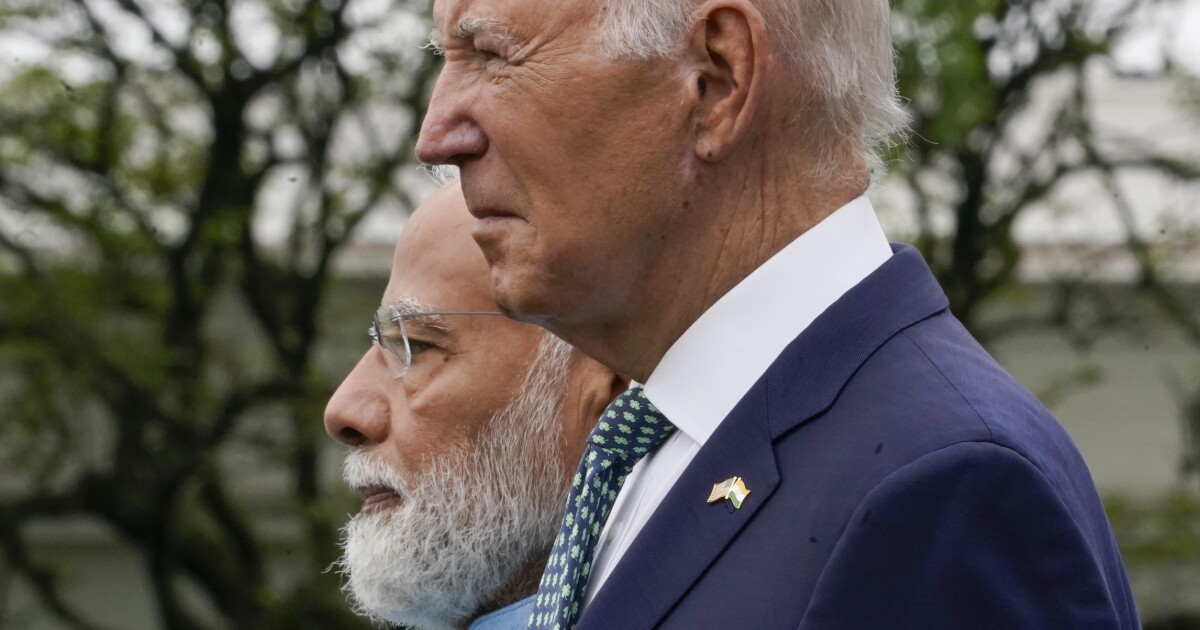

President Joe Biden faces a delicate dance as he strengthens ties with India amid accusations the country is sliding toward autocracy.
Indian Prime Minister Narendra Modi received a full state visit, addressed Congress, and dined with the Bidens at the White House on Thursday, just the third foreign leader to do so under the Biden administration.
BIDEN MANAGES TENSE RELATIONS WITH CHINA AS COVID-19 ISSUES REEMERGE
“Two great nations. Two great friends. Two great powers that can define the course of the 21st century,” Biden said in triumphant remarks alongside Modi on the South Lawn. “Mr. Prime Minister, thank you for your partnership.”
Modi gave a similar message, saying through a translator that both nations emphasize democratic values and diversity, with India and the United States working together “for global good and global peace.”
But Modi faces accusations of doing the exact opposite, backsliding on democracy and discriminating openly against political rivals and his country’s Muslim minority. That led some members of Biden’s own party to boycott Modi’s speech to Congress.
Rep. Alexandria Ocasio-Cortez (D-NY) tweeted on Wednesday afternoon that she was boycotting and would “encourage my colleagues who stand for pluralism, tolerance, and freedom of the press to join me in doing the same.”
She was joined by other “Squad” Reps. Cori Bush (D-MO), Rashida Tlaib (D-MI), and Ilhan Omar (D-MN), the latter two both Muslim. Sen. Bernie Sanders (I-VT), meanwhile, called on Biden to raise concerns about Modi’s actions during his meeting with the prime minister.
Human rights organizations have condemned India’s treatment of minorities and political opponents, in particular opposition leader Rahul Gandhi. Modi was denied a U.S. visa in 2005 over religious freedom violations, has clamped down on freedom of the press, and divided India’s only Muslim-majority state into two federally controlled territories.
The Squad’s pledge was in turn slammed by GOP presidential candidate Nikki Haley, herself an Indian-American, who blasted the group over its support of “Palestinian terrorists and socialist dictators.”
The conflict came to Biden and Modi directly when they were each asked about Democratic backsliding during an afternoon press conference.
Biden responded that he did bring up the issue with Modi and reassured that democracy was in the DNA of both countries. Modi also weighed in, saying there is no discrimination in his country based on caste, creed, religion, or gender.
The basic political calculation Biden has made, according to American Enterprise Institute scholar Sadanand Dhume, is that beefing up its alliance with India on the world stage outweighs concerns over Modi’s conduct within his country.
“The main reason for the visit is geopolitics, not domestic politics,” said Dhume, an expert on South Asia. “It’s because the U.S. views India as a potential counterweight to China.”
Increasing tensions with China have been one of the defining issues of the Biden presidency, one that appeared to escalate again earlier this week.
Countering Chinese influence is also a major priority for India, which shares a 2,000-mile border with China, where troops clashed late last year.
“Despite U.S. concerns over democracy and India’s relationship with Russia, all of that is outweighed by the China angle,” Dhume said. “China is what’s driving the relationship and the visit.”
There is a domestic angle for Biden, he added, which is that Indian Americans overwhelmingly support Democrats, meaning the visit is a chance for Biden to connect with an important constituency.
CLICK HERE TO READ MORE FROM THE WASHINGTON EXAMINER
That’s a benefit for Modi as well, according to Manjari Chatterjee Miller and Clare Harris of the Council on Foreign Relations.
“The Biden administration is clearly courting India as a political counterpoint to China, while Modi and the Bharatiya Janata Party see the visit as not only important for countering China but also for buttressing Modi’s global image,” the pair wrote. “Since both sides want the visit to be a success, the state of Indian democracy and human rights under the Modi regime, a crucial issue for critics in both the United States and India, are unlikely to be a major focus.”





